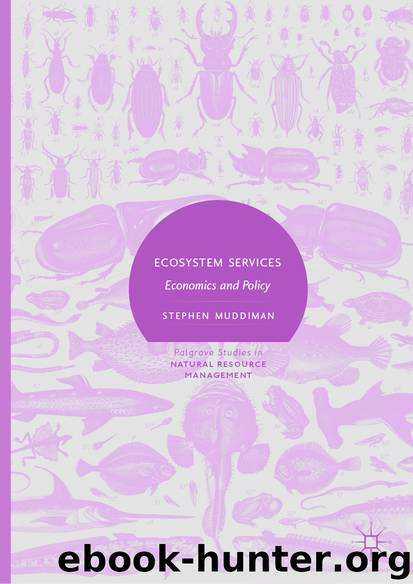Ecosystem Services by Stephen Muddiman

Author:Stephen Muddiman
Language: eng
Format: epub
ISBN: 9783030138196
Publisher: Springer International Publishing
Control
This brings us to how ecologists and economists view the concepts of control and management which involves two distinct perspectives. Firstly, there are the inherent controls present within ecological and economic systems, and secondly those interventions which are undertaken by mankind to influence the system being studied in order to deliver desirable outcomes.
In ecology, the type of habitats present in any location is determined by relatively few physical factors (see chapter “Basics”). However, the details of the component species and their interactions represent a snapshot in time of an ongoing series of relationships which drive not only the complex ecosystems we witness today, but are also responsible for previous and future adaptive changes in species morphology, physiology and life strategies.
When looking at habitats in these terms it becomes clear that simple overarching control mechanisms are rarely part of the ongoing evolutionary ‘arms race’. Each species responds and reacts to threats and opportunities, with either positive or negative outcomes. Many of the supposed control mechanisms which we observe (such as the dynamic relations between predators and prey, or parasite and host) are in fact localised feedback mechanisms which represent only a tiny isolated portion of the whole complex.
This view is reflected in the Austrian Economic concept of Praxeology, where individuals act in accordance with their own economic needs and priorities, rather than being subject to an overarching set of rules. It is the decisions of individuals which appear to give the impression of some kind of mechanism operating when viewed in aggregate. This is similar to the patterns seen in large shoals of fish or flocks of starlings, which appear to be under the control of a single coordinating mechanism, whereas it is in fact the decisions and behaviour of individuals working in a way which maximise the chances of individual survival. The patterns and apparent coordination is very much from the individuals involved, rather than the imposition of rules from an external source.
Mainstream economics , however, views the economy as a system in which individual behaviour is less significant as a determining factor than a few simple parameters which can be manipulated by relevant authorities (be they Central Banks or Governments). These elements (interest rates, taxation levels, quantity of money , regulatory regime, etc.) are seen as the key levers which determine the economic outcomes and prosperity of the citizens subject to the management activities, carried out in accordance with mainstream economic theory.
The idea of control and management within ecological systems can superficially appear to have the same raison d’etre as the control theories of mainstream economics . In that the adjustment of relatively few parameters is undertaken in order to provide desirable outcomes, in this case usually associated with the conservation management of particular habitats or species. However, there is an important distinction which may not be immediately apparent to the casual observer. Conservation management originates from a series of very distinct aims and objectives which relate to a defined subset of the whole. Such action is generally associated
Download
This site does not store any files on its server. We only index and link to content provided by other sites. Please contact the content providers to delete copyright contents if any and email us, we'll remove relevant links or contents immediately.
The Lonely City by Olivia Laing(4799)
Animal Frequency by Melissa Alvarez(4467)
All Creatures Great and Small by James Herriot(4314)
Walking by Henry David Thoreau(3955)
Exit West by Mohsin Hamid(3824)
Origin Story: A Big History of Everything by David Christian(3690)
COSMOS by Carl Sagan(3619)
How to Read Water: Clues and Patterns from Puddles to the Sea (Natural Navigation) by Tristan Gooley(3466)
Hedgerow by John Wright(3356)
How to Read Nature by Tristan Gooley(3337)
The Inner Life of Animals by Peter Wohlleben(3313)
How to Do Nothing by Jenny Odell(3296)
Project Animal Farm: An Accidental Journey into the Secret World of Farming and the Truth About Our Food by Sonia Faruqi(3219)
Origin Story by David Christian(3196)
Water by Ian Miller(3181)
A Forest Journey by John Perlin(3070)
The Plant Messiah by Carlos Magdalena(2927)
A Wilder Time by William E. Glassley(2860)
Forests: A Very Short Introduction by Jaboury Ghazoul(2836)
